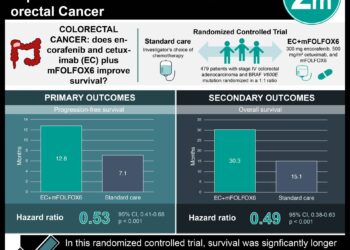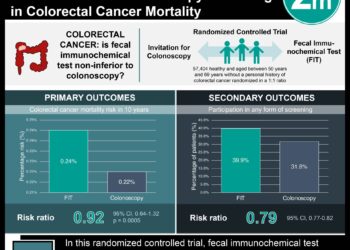Intensive follow-up after colorectal cancer treatment associated with increased recurrence detection
Image: PD
1. Regular CEA testing and CT imaging found more surgically curable recurrences than no scheduled follow-up
2. Intensive follow-up did not lead to a mortality benefit compared to no scheduled follow-up
Evidence Rating Level: 2 (Good)
Study Rundown: Previous research has suggested that serum CEA (carcinoembryonic antigen) measurement and CT imaging are the preferred methods to detect isolated metastatic recurrences of colorectal cancer. The appropriate follow-up regimen after curative treatment, however, is unclear. This study (the FACS—Follow-up After Colorectal Surgery trial) identified the ability to detect surgically treatable and curable recurrences. The authors found that regular follow-up with CEA testing, CT imaging, both individually and together, increased detection of such recurrences compared to no scheduled follow-up. No mortality benefit was found, and this was likely due to the study being underpowered—it had 31% power to detect a 5% effect on survival. Overall, this study provides evidence for improved recurrence detection using CT imaging and CEA testing.
Click to read the study, published today in JAMA
Relevant Reading: Postoperative surveillance in patients with colorectal cancer who have undergone curative resection: a prospective, multicenter, randomized, controlled trial
In-Depth [randomized controlled trial]: This clinical trial randomized 1,211 patients who had previously received curative treatment for primary colorectal cancer to one of four follow-up groups: 1) CEA follow-up, 2) CT follow-up, 3) CEA and CT follow-up, and 4) minimum follow-up. All participants underwent a pre-trial colonoscopy to assess any remaining disease and were followed at varying intervals depending on the assigned group for three years. All three groups with more intensive follow-up had greater curative surgical treatment of recurrence than those assigned to the minimum follow-up group (absolute difference 6.6-8.0%, p=0.02). However, the detection difference between CEA and CT only (OR 5.10 and 6.71, respectively) relative to minimum follow-up was not significantly different than the detection difference of combined CEA and CT group (OR 5.24) relative to minimum follow-up. Moreover, no mortality benefit was found between intensive follow-up by any method and minimum follow-up (p=0.35).
By Jonathan Lichkus and Rif Rahman
More from this author: Micronutrient supplementation linked with HIV-disease progression, Obesity without metabolic syndrome still associated with increased mortality,Childhood poverty may harm brain development, Prostate-Specific Antigen screening of elderly men varies significantly in primary care, Younger women more likely than men to present with acute coronary syndrome without chest pain
© 2012-2014 2minutemedicine.com. All rights reserved. No works may be reproduced without expressed written consent from 2minutemedicine.com. Disclaimer: We present factual information directly from peer reviewed medical journals. No post should be construed as medical advice and is not intended as such by the authors, editors, staff or by 2minutemedicine.com. PLEASE SEE A HEALTHCARE PROVIDER IN YOUR AREA IF YOU SEEK MEDICAL ADVICE OF ANY SORT.






